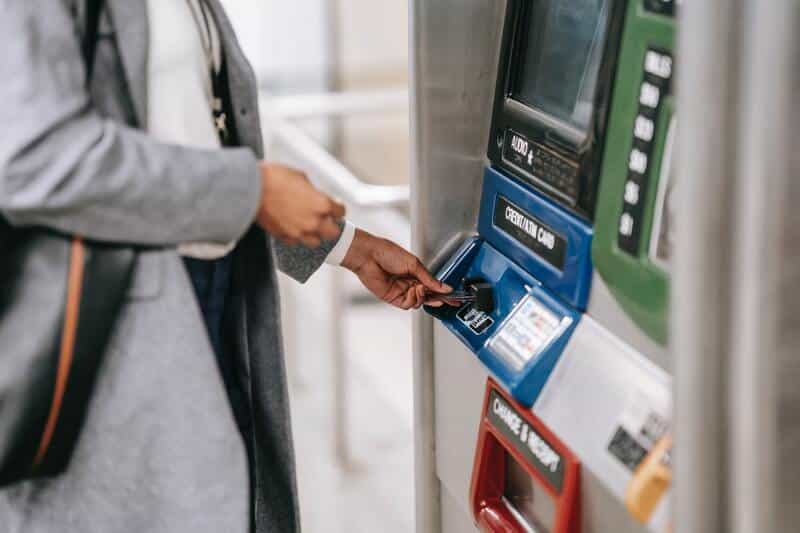5 Best Banks in Oman You Should Open An Account With
If you are looking to invest as an expat or high-net-worth individual, which is what I specialize in, you can email me (advice@adamfayed.com) or WhatsApp (+44-7393-450-837).
Table of Contents
Banks in Oman
Choosing reliable and trustworthy banks in Oman is one of the most important financial decisions you will make whether you are a resident or a foreigner looking to invest or settle in the country.
The right bank can provide you with a range of services, from basic checking and savings accounts to wealth management and investment opportunities, while the wrong bank can leave you with high fees, poor customer service, and limited options. That’s why knowing the best banks in Oman is crucial before making any financial decisions.
This blog aims to help you navigate the country’s banking landscape by providing information about the best banks in Oman. By the end of this post, you’ll better understand the best banks in Oman and which is the best fit for your needs.
What are the top banks in Oman?
A few major players dominate banking in Oman. Here’s a brief overview of each bank and the services they offer:
Bank Muscat
Bank Muscat is the largest bank in Oman and one of the leading financial institutions in the Gulf region. Founded in 1982, the bank has a strong presence in Oman and offers its customers a wide range of banking and financial services.
As the largest bank in Oman, Bank Muscat offers a wide range of banking and financial services, including personal and business banking, wealth management, investment services, and credit cards.
The bank has a strong network of branches and ATMs across the country and offers online and mobile banking services.
In terms of personal banking, Bank Muscat offers a range of accounts to suit different needs, such as current accounts, savings accounts, and fixed deposits. The bank also offers a range of loans, including personal, home, and car loans.
Additionally, Bank Muscat’s credit cards offer a range of rewards and benefits, such as cashback, discounts on dining and shopping, and travel benefits.
For businesses, Bank Muscat offers a range of services, including business loans, trade finance, cash management, and treasury services. The bank also offers a range of specialized services, such as project financing, corporate finance, and Islamic finance.
Bank Muscat is also committed to digital innovation and offers its customers a range of online and mobile banking services. These services include fund transfers, bill payments, account management, and mobile top-up.
Oman Arab Bank
Oman Arab Bank (OAB) is one of the leading banks in Oman and has been providing banking services since 1984. The bank offers its customers a wide range of products and services, including personal banking, business banking, and corporate banking.
The bank has a strong focus on customer service and offers innovative products and services to meet the needs of its customers.
In terms of personal banking, Oman Arab Bank offers a range of accounts, including current accounts, savings accounts, and fixed deposits. The bank’s savings accounts offer competitive interest rates designed to help customers build their savings.
Additionally, the bank’s credit cards offer a range of benefits, including cashback, discounts on dining and shopping, and travel rewards.
For businesses, Oman Arab Bank offers a range of services, including business loans, trade finance, and cash management.
The bank’s corporate banking services include a range of specialized solutions, such as project financing, syndicated loans, and Islamic finance.
The bank is committed to providing exceptional customer service and has won several awards. In 2020, Oman Arab Bank was named the ‘Best Bank in Oman’ by Global Finance Magazine for the third consecutive year.

National Bank of Oman (NBO)
With a history dating back to 1973, NBO is one of the oldest banks in Oman. The bank offers a range of services, including personal and business banking, wealth management, and investment services.
For personal customers, NBO provides a range of account options, including the Al Kanz Savings Account, which offers attractive profit rates and can be opened with a minimum balance of just OMR 10.
The bank also offers a range of current accounts that cater to different needs and lifestyles, such as the NBO Elite Account, which provides exclusive banking benefits.
NBO’s credit cards come with a range of benefits, including cashback rewards, travel benefits, and discounts on dining, shopping, and entertainment.
The bank’s loan products cater to different needs, such as personal loans, home loans, car loans, and education loans.
NBO offers a range of corporate banking solutions for businesses, including financing, trade services, and treasury management.
The bank also provides tailored services for small and medium-sized enterprises (SMEs), such as business loans and overdrafts.
NBO also offers digital banking solutions such as mobile banking, online banking, and phone banking. The bank’s mobile banking app provides customers access to their accounts, bill payments, and transfer facilities on the go.
In terms of awards and recognition, NBO has won several accolades over the years. In 2021, the bank was awarded the title of “Best Bank in Oman” by Global Finance magazine for the fifth consecutive year.
The bank has also been recognized for its sustainability initiatives and was named the “Best Bank for Sustainability” in Oman by Capital Finance International in 2020.
Ahli Bank
Ahli Bank is another leading bank in Oman that was established in 2004. The bank offers a range of personal and business banking products and services, including savings accounts, current accounts, credit cards, loans, and wealth management solutions.
Ahli Bank’s personal banking solutions are designed to cater to the diverse needs of its customers. The bank offers a range of savings accounts, such as the Al Mumayaz Savings Account, which provides competitive interest rates and features, including free online banking and a debit card.
The bank’s current accounts also provide customers with various benefits, including free checkbooks, online banking, and SMS alerts.
The bank’s credit cards come with various benefits, including cashback rewards, discounts on dining, shopping, travel, and travel insurance.
Ahli Bank’s loan products also cater to different needs, such as personal loans, car loans, and home loans.
For businesses, Ahli Bank offers a range of corporate banking solutions, including trade finance, project finance, and working capital finance.
The bank also provides tailored services for SMEs, including business loans, overdrafts, and letters of credit.
Ahli Bank has a strong digital presence and provides a range of digital banking solutions, including mobile banking, online banking, and phone banking.
The bank’s mobile banking app provides customers access to their accounts, bill payments, and transfer facilities on the go.
In terms of awards and recognition, Ahli Bank has won several accolades over the years. The bank was named the “Best Retail Bank in Oman” by the Asian Banker magazine in 2020.
Ahli Bank has also been recognized for its sustainability initiatives and was awarded the “Most Innovative Bank in Sustainable Finance” by Global Finance magazine in 2021.
Bank Dhofar
Bank Dhofar is a leading bank in Oman that was established in 1990. The bank offers a range of personal and business banking products and services, including savings accounts, current accounts, credit cards, loans, and wealth management solutions.
One interesting feature of Bank Dhofar is its innovative digital banking solutions. The bank has been at the forefront of digital transformation in Oman and was the first bank in the country to introduce biometric authentication for its mobile banking app.
This feature allows customers to access their accounts using their fingerprints, making banking faster, safer, and more convenient.
Bank Dhofar’s mobile banking app also offers a range of other features, including bill payments, fund transfers, and the ability to open new accounts.
The bank’s online banking platform also provides customers with a range of tools and services, including the ability to track their expenses and manage their finances.
In addition to its digital solutions, Bank Dhofar has also been recognized for its commitment to sustainability. The bank has implemented a range of sustainability initiatives, including using solar energy to power its branches and introducing paperless banking.
Bank Dhofar also offers a range of products and services that cater to the diverse needs of its customers. The bank’s savings accounts provide attractive interest rates and come with a range of features, such as free online banking and a debit card.
The bank’s credit cards come with various benefits, including cashback rewards and discounts on dining and shopping.
What are the different types of accounts offered by banks in Oman?
Banks in Oman offer a variety of accounts to cater to the different financial needs of their customers.
Current accounts
A current account, also known as a checking account, is an account that allows you to deposit and withdraw money as per your requirement. This account is suitable for day-to-day transactions such as paying bills, making purchases and transferring funds. Current accounts often come with an overdraft facility that allows you to borrow money up to a pre-agreed limit.
Savings accounts
A savings account is an account that allows you to deposit and save money. These accounts typically earn interest on the deposited amount and are designed to help customers build their savings. In Oman, some banks offer specialized savings accounts, such as children’s, senior citizens’, and salary-based savings accounts.
Investment accounts
Investment accounts allow you to invest your money and earn a return. These accounts may include options such as fixed deposits, mutual funds, and stocks. Some banks in Oman also offer Islamic investment accounts, which comply with Islamic financial principles.
Credit card accounts
Credit card accounts allow you to make purchases on credit and pay back the amount borrowed over time. These accounts come with a credit limit, and interest is charged on any outstanding balance. Credit card accounts also often come with various rewards and benefits, such as cashback, points, and discounts on purchases.
Loan accounts
Loan accounts allow you to borrow money from the bank for a specific purpose, such as buying a home or a car or funding a business. These accounts come with a pre-agreed repayment plan, including the interest charged on the borrowed amount.

What factors should I consider when choosing banks in Oman?
When choosing a bank in Oman, there are several factors that you should consider to ensure that you select the best option for your needs.
For one, the interest rates offered by a bank can significantly impact your earnings, whether you’re saving or investing. It’s important to compare interest rates across different banks to find the most competitive rates.
Banks may charge various fees, including account maintenance, transaction, and ATM fees. It’s important to consider these fees to avoid any unexpected charges that could affect your finances.
Consider the bank’s accessibility, including the availability of branches, ATMs, and online banking services. Choosing a bank that offers convenient access to your funds and services is important.
The security of your funds and personal information is also critical when choosing a bank. Be sure to choose a bank with strong security measures and a good reputation for safeguarding customer data.
Look for a bank that offers a range of products and services that meet your financial needs, whether it’s savings accounts, credit cards, loans, or investment options.
Finally, research the bank’s reputation to understand its financial stability, customer service, and overall reliability. This can help you make an informed decision and avoid any potential issues down the line.
How do I open an account with a bank in Oman?
Opening a bank account in Oman is a relatively straightforward process.
First, you need to research and choose a bank that offers the products and services that meet your financial needs.
Next, visit the nearest branch of your chosen bank with the required documentation. Provide the required identification documents, including your passport and residency permit, to the bank representative. You may also need to provide additional documentation, such as proof of address and proof of income.
Then, fill out the account application form and provide any additional information requested by the bank representative. Deposit the required minimum initial deposit into the account. The amount may vary depending on the type of account you’re opening.
You also need to sign the account agreement and review the terms and conditions of the account. Once your account is open, the bank will provide you with your account details, including your account number and any other necessary information.
The specific documentation required to open a bank account in Oman may vary depending on the bank and the type of account you’re opening.
However, you will need to provide a valid passport, a valid residency permit, proof of address, such as a utility bill or rental agreement, and proof of income, such as a salary certificate or bank statement.
It’s always a good idea to contact the bank in advance to find out what specific documents are required and to confirm any other requirements or procedures.
Do I need to know any specific rules or regulations when banking in Oman?
In Oman, banks must verify their customers’ identity before opening an account. To open an account, you will need to provide identification documents, such as your passport and residency permit.
Banks in Oman are required to comply with Anti-money laundering (AML) and counter-terrorism financing (CTF) regulations. This means they must take steps to prevent money laundering and terrorist financing, such as conducting due diligence on customers and monitoring transactions.
Banks in Oman must also comply with the Foreign Account Tax Compliance Act (FATCA), a U.S. law aimed at preventing tax evasion by U.S. citizens and residents. This means that the bank may request additional documentation from customers who are U.S. citizens or residents.
They are also required to maintain the privacy of their customer’s personal and financial information. This means they must obtain customers’ consent before sharing their information with third parties unless required by law.
Islamic banking is prevalent in Oman, and some banks offer sharia-compliant banking services. If you choose a sharia-compliant account, you should be aware of the specific rules and regulations that apply.
It’s important to understand these regulations and to comply with them when banking in Oman. The bank representative should be able to provide you with information about the specific rules and regulations that apply to your account.

How do I manage my finances with a bank in Oman?
Managing your finances with a bank in Oman can be easy and convenient. Most banks in Oman offer online banking services, which allow you to manage your finances from the comfort of your own home.
Online banking lets you view your account balances and transactions, transfer funds between accounts, pay bills, and set up automatic payments and transfers.
Many banks in Oman also offer mobile banking apps, which allow you to manage your finances from your smartphone or tablet. With a mobile banking app, you can check your account balances, view transaction history, transfer funds, and pay bills on the go.
Banks in Oman also allow you to set up automatic payments and transfers. This can be useful for recurring expenses, such as rent or utility bills. By setting up automatic payments and transfers, you can ensure that your bills are paid on time without manually initiating each payment.
Some banks also offer budgeting and tracking tools to help you manage your spending and savings. These tools can help you set financial goals, track expenses, and monitor your progress.
To take advantage of these services, you should sign up for them separately or enable them through your online or mobile banking account. The bank representative can provide you with information on the specific services and tools available to you.
How can I protect my money and personal information when banking in Oman?
When banking in Oman, protecting your money and personal information is important. Select a well-established and reputable bank in Oman to reduce the risk of fraud or theft.
Don’t share your personal information with anyone, such as your account number or PIN. Also, be careful when using public Wi-Fi or computers to access your online banking account.
Choose strong passwords for your online banking account, and don’t use the same password for multiple accounts.
Keep an eye on your account balances and transaction history, and immediately report any suspicious activity to your bank.
Some banks in Oman offer two-factor authentication, which adds an extra layer of security to your online banking account. With two-factor authentication, you need to enter a code sent to your phone or email and your password to access your account.
Be careful of emails or phone calls asking you to provide personal information, such as your account number or password. Banks in Oman typically don’t ask for this information via email or phone.
When accessing your online banking account, make sure the connection is secure. Look for the “https” in the URL, and the padlock icon in your web browser.
Finally, most banks in Oman have security measures in place to prevent fraud and identity theft. These measures may include data encryption, firewalls, fraud monitoring, and transaction verification.
Conclusion
Banking in Oman has become more accessible and convenient over the years, with banks offering various services to cater to different financial needs.
And since choosing the right bank can significantly impact your financial well-being, researching and carefully weighing your options can help you find the right bank that suits your financial goals and preferences.
Pained by financial indecision? Want to invest with Adam?

Adam is an internationally recognised author on financial matters, with over 760.2 million answer views on Quora.com, a widely sold book on Amazon, and a contributor on Forbes.



